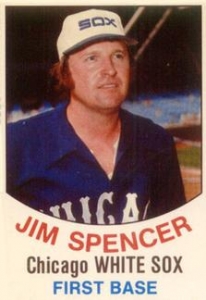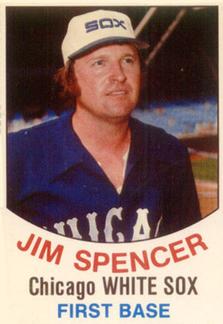May 14, 1977: Jim Spencer drives in eight runs in White Sox rout
 The 1977 Chicago White Sox – known ever after as the “Southside Hitmen” – may have been the most celebrated third-place club in major-league history. From Opening Day until season’s end, the Hitmen were never dull, either in victory or defeat. But Bill Veeck’s players really outdid themselves on the morning (and early afternoon) of May 14, as the White Sox took on the Cleveland Indians.
The 1977 Chicago White Sox – known ever after as the “Southside Hitmen” – may have been the most celebrated third-place club in major-league history. From Opening Day until season’s end, the Hitmen were never dull, either in victory or defeat. But Bill Veeck’s players really outdid themselves on the morning (and early afternoon) of May 14, as the White Sox took on the Cleveland Indians.
Did I say “morning”? Indeed; the White Sox-Indians game that day began a little after 10:30 A.M. Although this was the only game of club President Bill Veeck’s second White Sox tenure (1976-80 seasons) that was scheduled to begin prior to noon,1 such contests were part of Veeck’s long tradition. While running the minor-league Milwaukee Brewers during World War II, Veeck staged several “Rosie the Riveter” contests, with fans receiving bottles of milk and breakfast fare upon entering the park.2 The 1977 White Sox morning game may not have included many riveters, but the Saturday contest did draw a crowd of 13,923 (including the author and a friend), with the attendees given coupons for a free breakfast.3 In all honesty, that was fairly modest attendance for the 1977 White Sox, who entered the May 14 game in second place in the American League West with a 19-11 record, only a half-game behind the division-leading Minnesota Twins. Indeed, of the eight Saturday day games the White Sox played in 1977 (doubleheaders not included), only the April 16 contest against the expansion Toronto Blue Jays drew lower attendance.
Sparse crowd or not, those who attended the May 14 game saw plenty of action – much of it provided by first baseman Jim Spencer. One of the few members of the Southside Hitmen known for his fielding prowess, Spencer would win two Gold Gloves at first base during his major-league career, including one in 1977 (the first was in 1970). On offense Spencer could hardly be considered a slugger, but he reached double figures in home runs eight times during his 15-year major-league career, with a career total of 146 homers. (He would reach his single-season high in 1979 with 23.) In 1976 the left-handed-hitting Spencer had actually tied Jorge Orta for the White Sox team lead with the modest total of 14 homers, and his 18 home runs in 1977 would be tied for the second-highest total of his career. However, he entered the May 14 contest with only three homers and 13 RBIs for the season (in 30 games played). Spencer was so modestly regarded that he was not even listed on the 1977 American League All-Star Game ballot.4
Spencer’s big day began in the bottom of the second inning, with the game still scoreless. After Richie Zisk led off the inning with a triple to center field, Spencer followed with a home run off Indians starter Jim Bibby. After Bibby retired Oscar Gamble, the White Sox responded with three more hits, prompting Cleveland manager Frank Robinson to replace Bibby with left-hander Sid Monge. The rally continued, and when Zisk came up for the second time in the inning with two outs and runners on first and third, Robinson made the somewhat unorthodox move of ordering an intentional walk, setting up a lefty-against-lefty matchup against Spencer but moving Alan Bannister to second to load the bases. “Can’t figure that one out,” one of the White Sox coaches told Chicago Tribune writer Richard Dozer about the move.5 The strategy backfired when Spencer singled to right for two more runs, giving the White Sox seven runs in the inning, with four RBIs credited to Spencer.
It was still 7-0, White Sox, when Spencer next came to the plate, in the bottom of the fourth inning. He was facing Cleveland’s third pitcher, right-hander Pat Dobson, and once more the bases were loaded, with two out. Spencer responded with the first grand-slam of his major-league career, making the score 11-0 and giving Spencer eight RBIs on two home runs and a single in only four innings of play.
The eight RBIs matched the White Sox team record for runs batted in a game held by Carl Reynolds (July 2, 1930) and Tommy McCraw (May 24, 1967). (At the time the White Sox reported that Joe Jackson had also driven in eight runs in a game in 1920, but that was later corrected.) More importantly, Spencer figured to have at least a couple more plate appearances to challenge the major-league record for RBIs in a game (12 by the Cardinals’ Jim Bottomley on September 16, 1924; later equaled by the Cards’ Mark Whiten in 1993) or the American League single-game record of 11 RBIs (the Yankees’ Tony Lazzeri on May 24, 1936).
But Spencer never got the opportunity; with the White Sox holding an 11-0 lead, manager Bob Lemon took Spencer out of the game, replacing him with Lamar Johnson after the completion of the fourth inning. It’s a tantalizing “what might have been,” as the White Sox continued to pound away at Cleveland pitching, ultimately winning the game 18-2. It was the most runs scored by the White Sox in a single game since an 18-8 defeat of the Twins on June 20, 1971.
All other things being equal, Lemon’s decision to remove Spencer from the game would have drawn no controversy. The Sox and Indians had played a 7:30 P.M. game on Friday night6 (a 5-3 White Sox victory), and since the game had lasted 2:42, the teams were taking the field on May 14 a little over 12 hours after the previous night’s game had concluded. Lemon had removed right fielder Richie Zisk (replacing him with Wayne Nordhagen) after the third inning, when the score was 7-0, and he removed left fielder Ralph Garr (replacing him with Jerry Hairston) after the fourth inning along with Spencer. Cleveland manager Frank Robinson also removed two of his starting position players after the third inning. Spencer’s replacement, Lamar Johnson, wound up batting twice, coming up with a runner on third with one out in the sixth inning and then leading off the inning in the eighth. “I didn’t have any idea that he had a shot at setting a record, but if I did, I’d have asked him if he wanted to stay in,” Lemon said after the game. “Next time he drives in eight, I’ll remind him,” he quipped.7
Lemon was joking, but he didn’t have to wait long to see Jim Spencer have another eight-RBI game. Facing the Minnesota Twins at Comiskey Park on July 2, Spencer drove in eight runs once more; again his big game included a grand-slam (off left-hander Bill Butler) in the fourth inning, along with an RBI single in the sixth and a three-run homer in his final trip to the plate in the eighth inning of a 13-8 White Sox victory. Two eight-RBI games in a single year: not bad for a fellow who was primarily noted for his glove!
Sources
In addition to the sources cited in the Notes, the author also accessed Retrosheet.org, Baseball-Reference.com, and SABR.org.
Notes
1 Verified by a review of the league schedules (which included start times) in the American League Red Books from 1976-80.
2 Sam Levy, “Prexy Bill’s Side-Splitting Sideshows Putting Merry Click in Milwaukee Gate,” The Sporting News, August 5, 1943.
3 Richard Dozer, “Spencer Drives in 8 Runs as Sox Whip Indians 18-2,” Chicago Tribune, May 15, 1977.
4 Richard Dozer, “Spencer Answers All-Star Snub With RBI Show for White Sox,” The Sporting News, June 4, 1977.
5 Dozer, “Spencer Drives in 8 Runs.”
6 “Sports Log,” Chicago Tribune, May 13, 1977.
7 Dozer, “Spencer Answers All-Star Snub.”
Additional Stats
Chicago White Sox 18
Cleveland Indians 2
Comiskey Park
Chicago, IL
Box Score + PBP:
Corrections? Additions?
If you can help us improve this game story, contact us.


